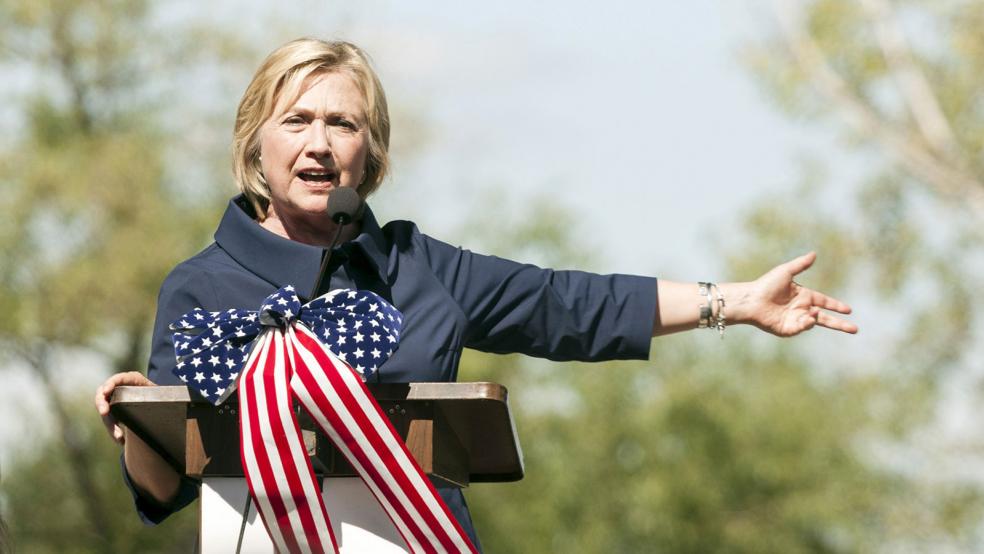By calling for a 4 percent tax surcharge on Americans making more than $5 million a year, Democratic presidential candidate Hillary Rodham Clinton appears more determined about forcing the very richest in the country to pay more in taxes than engineering major tax reform that would affect Americans across the board.
Clinton’s proposal would raise an estimated $15 billion a year over the coming decade by targeting a tiny fraction of 1 percent of the wealthiest taxpayers. Her chief rival, Sen. Bernie Sanders of Vermont, has vowed to raise trillions of dollars in tax revenue over the coming decade to fund free college tuition and expand Social Security benefits.
Related: Clinton's Capital Gains Tax Plan Aims At Long-Term Investment
Echoing billionaire investor Warren Buffett’s rule of thumb that Americans making more than $2 million a year should pay a tax rate of at least 30 percent, Clinton’s proposed surtax would nick tax filers with adjusted incomes of over $5 million with a tax rate of as much as 43.6 percent on income from wages, businesses and partnerships, and between 27.8 percent and 47.4 percent on capital gains, according to an analysis by the non-partisan Tax Foundation.
While potentially tens of millions of middle and upper income taxpayers would be impacted by Sanders’ federal tax proposals, which have yet to be formally unveiled, only about 35,000 of the wealthiest taxpayers would be hit by Clinton’s proposed new top tax bracket, according to the Tax Foundation. Sanders has hinted he will propose a large increase in the top marginal income-tax rate, now 39.6 percent. He has also proposed slightly increasing the payroll tax rate to cover expanded Social Security benefits, which means that even low-income families would have to pay more.
Internal Revenue Service data show that the top 400 taxpayers who made an average income of $265 million in 2013 paid a 22.9 percent federal income tax rate, up from 16.7 percent in 2012, according to Bloomberg. Clinton’s surtax proposal would build on increases advocated by the Obama administration that took effect in 2013.
Bernie Sanders’ $18 Trillion Price Tag If Elected President
“Hillary is talking about raising taxes on a small subset of 1 percent of taxpayers. Bernie Sanders is talking about taxing just about everyone…. It’s a huge difference in scale,” Alan Cole, an economist with the Tax Foundation, said on Tuesday.
Moreover, the wealthiest Americans can afford clever tax lawyers and accountants to find ways to blunt the impact of the proposed surtax. And there is no indication that Clinton’s proposal would be accompanied by reductions in a myriad of tax loopholes and write-offs that would help many keep their adjusted tax income below $5 million.
Clinton’s push to raise the top tax rate for the wealthiest people in the country comes as Sanders continues to gain momentum in his challenge to her for the Democratic presidential nomination. The latest polls show the Vermont senator leading Clinton in Iowa and New Hampshire, the sites of next month’s first presidential caucuses and primary election. This is Clinton’s second major proposal on taxes. Last July, she proposed a change in the top capital gains tax rate to foster long-term growth.
Related: The Pros and Cons of Bernie Sanders’ $50 Billion Tax Idea
Clinton embraced the so-called “Buffett Rule” last December, when she held a joint campaign appearance with Warren Buffett in Omaha, Nebraska. Taken together, the Buffett Rule and Clinton’s 4 percent surtax would have the effect of significantly raising top earners’ taxes on capital gains, which are currently taxed at 23.8 percent top rate, according to Bloomberg. The rate was 28 percent when former President Bill Clinton took office in 1993, but was cut to 20 percent during his presidency.
Clinton said a change in the federal tax code that favors nurses and truck drivers over hedge fund managers could pay for job, infrastructure, and health-research initiatives, according to Bloomberg, but Sanders and his aides say her plan isn’t bold enough.
“At a time of grotesque income and wealth inequality and when trillions of dollars have been transferred from the middle class to the top one-tenth of 1 percent over the last 30 years, Secretary Clinton’s proposal is too little too late,” Sanders campaign spokesman Michael Briggs said in a statement.





